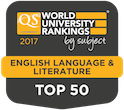The structure of the undergraduate English programme made it easy for me to explore my interests, and create a path that worked for me. First year provided me with a broad spectrum of English Literature, setting me up with critical thinking skills that would be crucial not only in English, but also useful in my other subject. As I progressed through second and third year, I could hone in on the topics I was most interested in, tailoring the course to be focused around these areas. With such an individualised course, I was never stuck studying a topic that bored me.
---Anna Graham, Joint Honours English Student, Class of 2016
I originally chose to study English because I liked to read. Studying English at UCD, however, has introduced me to a fascinating world of critical and cultural theory I now look forward to continuing my learning in. Getting to study English as a single subject major, in particular, allowed me the opportunity to gain a far stronger footing and deeper understanding of my chosen research area, and forge influential, formative relationships with many members of the school’s staff. Through the school, I also got the chance to study abroad for a year in Barcelona. This time — exploring a new culture and meeting new people from around the world — has been, without a doubt, the greatest experience of my life. My time at UCD — the diverse learning material, passionate and supportive staff, and close bond with my classmates — is something that I will carry with me for years to come.
---Seán Hayes, Single Honours English Student, Class of 2017
Going back to education after nearly three decades seemed daunting. It turned out to be one of the most challenging and rewarding experiences of my life. The reason I came to UCD was to deepen my knowledge of English literature. I was not expecting to discover a passion for the plays of Shakespeare and Beckett; the novels of Dickens and Woolf; or the poetry of Marvell and Heaney. In my third year, I found myself immersed in Elizabethan Ireland as I completed a dissertation on Edmund Spenser. It hasn’t all been easy but every step of the way I have received guidance and encouragement from the teaching staff and fellow students. For me, UCD is where new discoveries have become lifelong passions.
---Pearse McCaughey, Single Honours English Student, Class of 2017
I started my undergrad in English literature without really knowing what to expect. Having a great love for reading, writing and storytelling, I initially saw my BA as means of encountering a diverse range of literature, not necessarily looking ahead to what I’d do once my degree was complete. Fortunately, not only did I acquire a valuable set of skills over the course of my studies, emerging as an effective communicator and critical thinker, but also discovered a passion for Medieval and Early Medieval literature. Now, coming towards the end of an MA in medieval literature and culture, I am considering pursuing a PhD in the near future, with an eye towards a career in academia. A useful skill set, an array of new interests and a close circle of friends have made my BA in English literature a truly memorable and worthwhile experience, one that I would unreservedly recommend.
---Karl Milne, Single Honours English Student, Class of 2016
 Study English at UCD if you are an enthusiastic reader, talker and writer, and love literature. Strengthen your understanding of narrative, poetic and dramatic forms. Enlarge your critical vocabulary and historical awareness. Explore how the study of literature intersects with questions of gender, politics and cultural theory. Learn how to research a topic, evaluate evidence and present your ideas in a cogent, elegant fashion. Become a creative and dynamic critic yourself!
Study English at UCD if you are an enthusiastic reader, talker and writer, and love literature. Strengthen your understanding of narrative, poetic and dramatic forms. Enlarge your critical vocabulary and historical awareness. Explore how the study of literature intersects with questions of gender, politics and cultural theory. Learn how to research a topic, evaluate evidence and present your ideas in a cogent, elegant fashion. Become a creative and dynamic critic yourself!